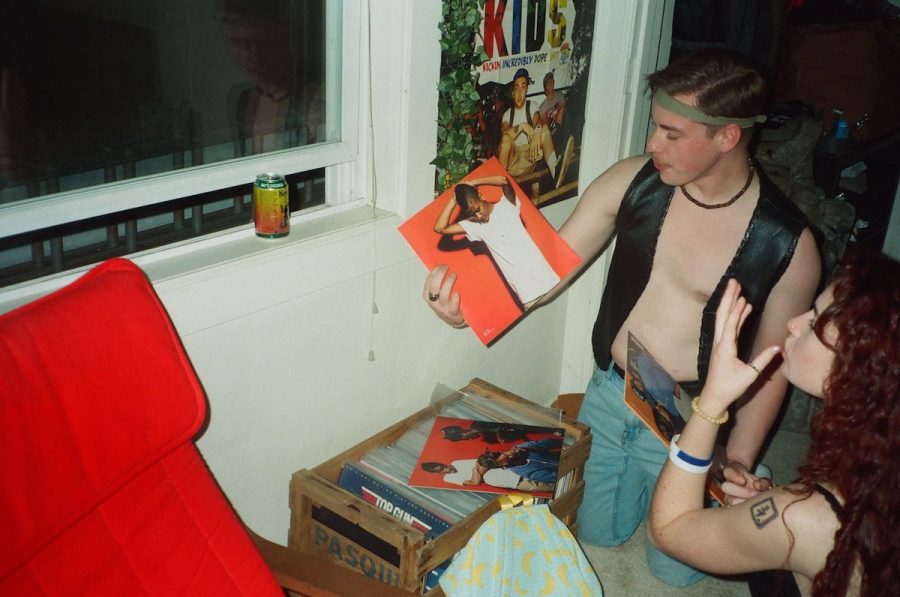Still Spinning: How vinyl got its groove back
An unlikely alliance has kept record stores open into the 2020s
Photo by Oludare Obadiya
An unlikely alliance has kept record stores open into the 2020s
By the 1970s, a record player was a necessary expense for any music listener, and the more music you listened to, the more records you owned.
But as the years went on it became easier to listen to music in other ways. Small, pocket-sized cassette tapes started lining the shelves of homes across the country.
Along with the advent of The Walkman, this meant you could listen to music on the go — what a concept.
Eventually, CDs came around as the supreme method of listening to music, though they still required the consumer to have a physical copy.
The late 1990s and early 2000s brought sites like Napster and iTunes. Now you could purchase or oftentimes illegally download an unlimited amount of music — one song or album at a time — from a confusing, relatively new invention people were calling “the internet.”
As is widely known, this would eventually evolve into apps like Spotify and Apple Music. It was then, during the early 2000s, that records and record players officially became relics of the past, or so we thought.
In a time where there’s a JBL Bluetooth speaker at the heart of every basement party, it’s interesting to think that there may also be a record player upstairs.
The thinly-grooved black discs were all but defunct at the turn of the century, so how are records still spinning well into the 21st century?
The first reason is a group of people whose mere mention brings up mixed emotions.
Hipsters.
Ah yes, you can find them in a quiet corner of most functions, donning a beanie, a carefully manicured mustache and perhaps some fake glasses, likely sipping on a beer you’ve never heard of.
They’re probably blathering on about topics they deem obscure enough to be cool to talk about, one of which may be record collecting, or crate-digging as it has become known.
When it comes to music, there are two brands of “the hipster.”
The first is the kind who buys a record player along with some records and plays it once or twice before allowing it to become a clunky, expensive decoration in the corner of their bedroom. (Though I may reject the notion, this first one comes dangerously close to describing myself.)
The second, admittedly less obnoxious iteration of the hipster is the kind who carefully curated a collection of records and makes a point to use them any chance they get.
They can be recognized as the host at a dinner party who darts in and out of the dining room to flip and swap out vinyls, refusing to embrace the new and strikingly-more-convenient invention of Bluetooth.
This more honest, down-to-earth record-lover leads into the next reason record stores are still a somewhat-viable business.
Crate-diggers
For this group, record players are less an out-of-date music listening apparatus and more a classic, slowly-fading piece of musical artistry.
A person in this group genuinely believes that the soft crackles and scratches vinyls produce when played make for a better, more authentic listening experience.
They spend countless hours at nearby and far-away record stores digging for vinyls to add to their collection. What makes this group different is their seemingly encyclopedic knowledge of music.
Your average hipster has the same jams you have in your liked-songs playlist just in a bulky, breakable, physical form. No new ground is really getting broken.
A crate-digger, however, could introduce you to Zambian rock music from the 1970s followed by some old, European disco you can’t find on Spotify then, just to keep you on your toes, throw on some 2000s top 40.
This kind of person will likely expose themself by talking about music for hours on end — whether you’re listening or not.
Record store owners everywhere owe them and this next group a pretty big debt.
Gen Z
The members of what has become known as Generation Z, those born between the mid-1990s and the early-2010s, have a pervading infatuation with all the things that came before us.
Most of us don’t have the disdain for the mainstream that drives your average hipster, and we also don’t all have the same impressive musical knowledge as the aforementioned, fanatical crate-diggers.
What we do have in spades, however, is curiosity. A yearning to know more. Now, given that the oldest of us have yet to reach the age of 30, things could definitely still go downhill.
Perhaps as we get older and get kids, mortgages and 9-to-5s — you know responsibilities — we’ll get more cynical and stuck in our ways, but for now we lead the charge.
Our inquisitive nature leads us to wander the aisles of record stores for 30 minutes at a time, eventually picking up a vinyl or two even if they just end up becoming wall decorations.
And if our curiosity, combined with the passion of crate diggers and the carefully curated personalities of hipsters, is enough to keep a dying industry afloat for the time being, that’s alright with me.
Obadiya can be reached at [email protected]

Oludare is a fourth-year journalism student and this is his fifth semester on The Spectator. He likes watching basketball and is pretty mediocre at it, but that doesn't stop him from playing it. He has a small but growing record collection and believes Woody Harrelson is a style icon and national treasure — fact not opinion.











